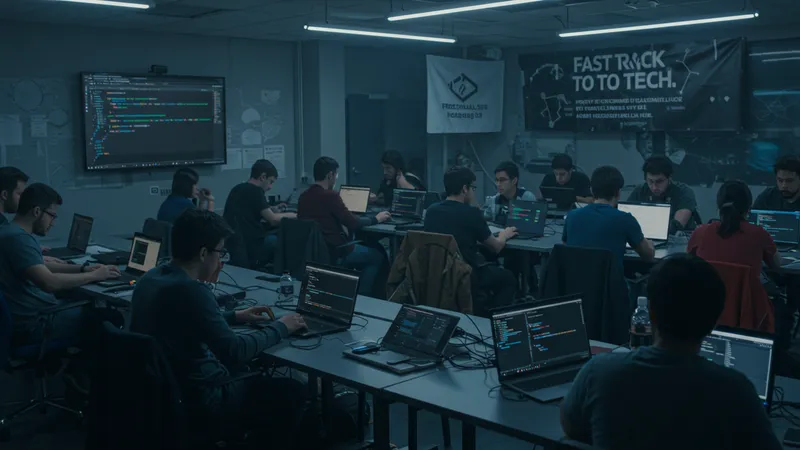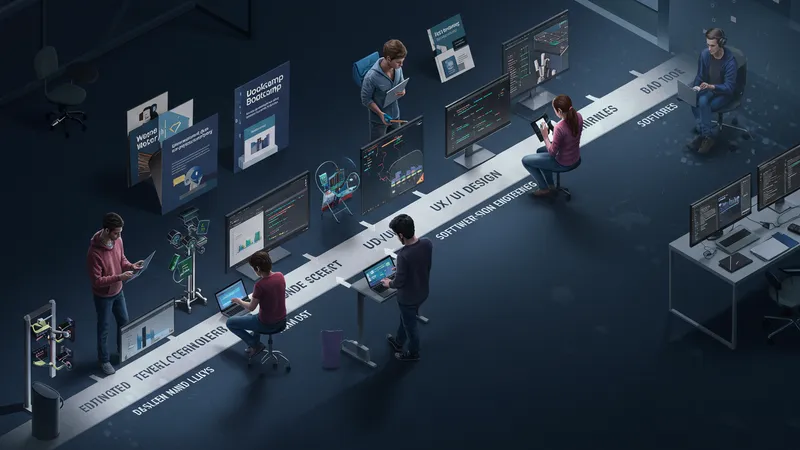A recent statistic might shock you: 70% of graduates from top coding bootcamps reportedly land jobs at major tech firms within just 90 days. It's a world-changing reality that begs close attention.
In an age where tech skills are the new currency, understanding coding bootcamps' true value—and pitfalls—has never been more crucial. With life-changing opportunities and unexpected truths lurking beneath the surface, the stakes have never been higher.

It's tempting to imagine a world where a few weeks of intense study could land you a prestigious job. A bootcamp promises speed and efficiency, outsmarting the lengthy and often costly traditional college settings. But here’s a twist: critics argue that many bootcamps don't deliver on their promises, with some even accusing them of churning out unprepared graduates. Yet, some bootcamp graduates earn six-figure salaries right out of the gate. But that’s not even the wildest part…
These programs also offer a remarkable variety of learning formats—ranging from in-person to remote, full-time to part-time. The flexibility appeals to career switchers and those seeking to upskill without committing years of study. But every silver lining has its cloud; hidden costs and unexpected challenges abound. Some never graduate, while others question the return on investment. What happens next shocked even the experts…
Coding bootcamps promise lucrative careers, but the true cost often extends beyond tuition fees. Many students face hidden expenses like software costs, high living expenses in tech hub cities, and the opportunity cost of foregone income during training. These can add up rapidly, leaving graduates financially strained. Yet, a shockingly high percentage claim the reward is worth every penny. What you read next might change how you see this forever.

Despite this, bootcamps sometimes offer job placement guarantees to entice prospective students. However, not all include the nuance of internships or entry-level positions instead of full-time secure roles. These guarantees can be misleading, causing tension and disappointment when expectations outpace reality. But there’s one more twist that could redefine your perspective on these programs.
On the flip side, some alumni stories are inspiring, showing remarkable transitions from low-paying jobs to lucrative tech positions. The journey is not without its hurdles; late-night coding sessions and tight deadlines are common. Moreover, the employment landscape is evolving rapidly, demanding continuous learning even post-bootcamp. How do these programs prepare students for such challenges?
While bootcamps have democratized tech education access, especially for underrepresented groups, the road is not easy. The pressure to perform is immense, leading to burnout for some. Yet, the promise of a job well done fuels many, but the reality is many programs require students to be self-motivated, resilient, and proactive. Discover the hidden realities of these commitments next.
The idea of transitioning into a tech career after just a few months is alluring, and bootcamps sell this dream fiercely. However, the fast track requires relentless dedication, and not everyone thrives in such high-pressure environments. Bootcamp curricula are extremely intensive, condensing what might take years in college into months. But did you know that not all graduates feel prepared for the real-world coding challenges?

Despite marketing claims, coding bootcamps often overlook depth in favor of breadth. This tradeoff can leave students feeling like jack-of-all-trades, master of none. Yet, this breadth provides a crucial overview, potentially igniting a passion for further self-study and specialization in specific languages or frameworks.
In truth, success heavily relies on the individual’s pre-existing skill set and adaptability to self-directed learning. Bootcamps vary widely in quality; what works for one student might spell disaster for another. Personal testimonials reveal that mentorship and support networks can make all the difference during and after bootcamp. But there’s more to unravel about these hidden dynamics and support systems.
Moreover, the disparity in learning methods—from video lectures to live coding sessions—can be either a blessing or a curse. For some, the immersive, hands-on approach fosters growth; for others, it overwhelms. The question remains: do bootcamps truly simulate the collaborative environments of tech workplaces, and how do they address team dynamics?
Coding bootcamps pride themselves on their curated curriculum designed to meet current industry demands. But a closer inspection suggests that curricula vary significantly between bootcamps in style and content. Some focus predominantly on web development, while others venture into data science, UX/UI design, or software engineering. This specific targeting can narrow your post-bootcamp opportunities based on industry trends.

Yet, not all programs update their material frequently enough to keep pace with the breakneck speed of technology advancements. Outdated practices can inadvertently stifle a student’s creativity and problem-solving approach, creating a disconnect between education and real-world expectations. What’s more is often omitted in marketing materials: just how much outside research is expected of each student.
The efficacy of a curriculum can hinge on hands-on projects, which are integral for students to demonstrate their skills. Capstone projects, usually crafted towards the end of a bootcamp, allow students to integrate and apply what they've learned. However, critics argue that these projects don't always reflect industry-standard work and can leave gaps between theory and practice.
Adding to the complexity, not every student receives individualized feedback or support needed to bridge their understanding. Programs with smaller cohort sizes might offer more personalized attention, but the scale-up in cohort size can dilute the quality of instruction and mentoring. The question is—how can students effectively evaluate bootcamp offerings and make informed decisions to ensure value?
Mentorship can be a game-changer in any learning environment, and bootcamps are no exception. Programs that offer one-on-one mentoring or small group sessions stand out, providing critical personalized feedback and industry insights. But the availability and quality of mentors can vary widely across programs, leading to uneven student experiences.

The community aspect of bootcamps cannot be underestimated either. Networking opportunities often arise from interactions with fellow students, instructors, and alumni during and beyond the program. This network can serve as a support system, opening doors to job opportunities and collaborative projects post-graduation. However, forming genuine connections often requires additional effort and engagement from the students themselves.
However, not all bootcamps prioritize community building, leaving students feeling isolated. Particularly for remote or part-time programs, lack of physical presence can hinder relationship formation and teamwork skills essential for most tech roles. Some students report that this challenge is compounded by inadequate communication platforms and a missing sense of camaraderie among peers.
For those with robust alumni networks, the benefits are clear. Alumni can offer invaluable advice, mentorship, and job referrals, contributing significantly to the success of new graduates. Exploring how bootcamps facilitate alumni connections reveals more about the long-term support they offer. Dive deeper into the unexpected influence of these networks next.
The allure of coding bootcamps often stems from transformative success stories where individuals leap from unrelated fields into thriving tech careers. Stories of students who land high-paying jobs with top tech companies post-bootcamp are powerful motivators for prospective attendees. But are these stories the norm or rare exceptions crafted to boost enrollment?

Research indicates that while many graduates do find success, it's often a result of sheer perseverance and additional work outside the bootcamp. Those who actively pursue networking opportunities and skill enhancement tend to thrive. Many alumni attribute their achievements to tapping into the unadvertised resources of alumni advice and continual mentorship.
Outside the sensational stories, there are those who struggle to transition into a competitive tech landscape. Soft skills gained through previous non-tech roles can serve as secret weapons in job interviews and team projects, yet such skills are rarely the focus during tech training. Embracing these personal narratives reveals the multidimensional paths to success.
For every success story, there lies a tale of resilience, adaptability, and the willingness to pivot. Highlighting the importance of soft skills and networking cannot be overstated. As you explore the nuances in these diverse career trajectories, you begin to see how motivational these student achievements can instill hope—and provoke curiosity about what's truly possible with a coding bootcamp education.
The tech industry is known for valuing skills and competencies over formal education credentials. Many employers have shifted from exclusively sourcing talent from prestigious universities to considering coding bootcamp graduates. But these perceptions can be mixed, with some employers skeptical about the depth and quality of bootcamp graduates' skills.

Some organizations have established direct hiring partnerships with bootcamps, betting on their ability to produce job-ready candidates. Employers value the intense focus bootcamps place on practical skills and current industry technologies, which can sometimes surpass the theoretical knowledge gained in a traditional college setting.
Yet, hiring managers look for well-rounded individuals, including soft skills and problem-solving abilities that aren't always prioritized in tech-driven bootcamps. Companies often gravitate toward graduates who exhibit initiative through personal projects or continuous learning. Insight into what distinguishes hired graduates is crucial for understanding bootcamps' workplace efficacy.
The narrative of bootcamp success narratives can overshadow the challenges graduates face in securing employment. While bootcamps equip students with technical knowledge, the transition to work environments involves understanding corporate culture and teamwork. With mixed employer perceptions, the journey for bootcamp graduates can be unpredictable and nuanced, sparking a need to dive into these industry perspectives further.
With the tech industry's rapid growth, coding bootcamps seem well-poised for continued expansion. Innovation is at the forefront as bootcamps adapt to offer diverse programs catering to industry needs—from blockchain to artificial intelligence. But will they keep pace with technological advancements and evolving employer expectations?

The shift toward remote learning has driven many bootcamps to adopt hybrid models, offering flexible schedules for students worldwide. This format opens doors for a global student base, breaking traditional geographic boundaries. However, this raises questions about maintaining quality and engagement at scale.
To stay relevant, bootcamps must continuously revise curricula to incorporate emerging technologies and methodologies. Alumni successes highlight the value of ongoing updates, yet some institutions lag behind. Those that proactively evolve stand out; those that don’t risk obsolescence.
Moreover, with increasing choices on the market, prospective students must become savvy evaluators of bootcamp quality. The future will see heightened competition among bootcamps, making transparency about outcomes and methodologies critical. What shifts are likely to shape the bootcamp landscape next?
Choosing the right coding bootcamp can feel overwhelming given the plethora of options. Prospective students must assess factors beyond course cost, such as curriculum relevance, instructor quality, alumni networks, and job placement services. But what practices ensure a comprehensive evaluation?

Checking online reviews and speaking directly with alumni provide valuable insights into program strengths and weaknesses. However, students must remain wary of reviews potentially skewed by marketing. Directly contacting alumni for unbiased opinions can reveal program nuances and set realistic expectations.
A closer look at data transparency—like graduation rates, hiring statistics, and salary averages—helps prospective students make educated choices. Bootcamps that openly share these metrics likely have higher accountability and student success. But not all statistics may be equally transparent or verifiable.
Finally, evaluating the level of personal support offered, such as mentorship or career coaching, is crucial. A program that provides ongoing guidance positions students for long-term success, bridging the gap from education to career. Let's explore how to navigate these paths to find the ultimate bootcamp fit.
Coding bootcamps have played a transformative role in diversifying the tech industry. These programs offer a gateway for underrepresented groups to gain tech skills, creating opportunities previously inaccessible due to high costs or educational barriers. But how effective have bootcamps been in fostering true industry diversity?

Many bootcamps actively recruit women, minorities, and veterans, offering scholarships and financial aid to promote inclusion. This opens doors for diverse voices and perspectives in tech innovation. Still, the challenge lies in converting diversity in enrollment to diversity in employment, a crucial transition yet to be fully realized.
The success of such initiatives varies widely, with some bootcamps fervently promoting diversity in their teaching staff and leadership. Diverse educational environments provide a richer learning experience but require conscious effort from institutions to maintain inclusivity. This begs the question: Are these efforts meeting their full potential, or is more needed to bridge the remaining gaps?
Given the industry's growing emphasis on diversity and inclusion, bootcamps stand at the forefront of change. Their ability to adapt and innovate will play a critical role in shaping a tech landscape that truly represents our society’s breadth. As these dynamics evolve, a deeper exploration into effective diversity strategies is crucial.
Lifelong learning is imperative in the ever-evolving tech world, where skills quickly become obsolete. Coding bootcamps can instill the mentality of continuous learning essential for career advancement. But how do they prepare students for a journey of ongoing education and adaptation?

Most bootcamps emphasize foundational skills and problem-solving techniques, empowering graduates to adapt to future changes. Yet, the responsibility often falls on students to cultivate a mindset for self-directed learning and professional development. Mentorship and support networks established during bootcamps often continue to play an essential role in career longevity.
Alumni who succeed in dynamic tech environments often share one commonality: a commitment to continuously enhance and expand their skills. Bootcamps that foster communities of continuous learners can offer immense value, providing a springboard for graduates into lifelong personal growth.
However, such environments are rare, with few bootcamps offering robust alumni resources or access to advanced-level courses post-completion. As the tech industry emphasizes agility and adaptability, bootcamps need to adapt by incorporating future-focused materials and sustaining learning networks. It's clear that ongoing education is more vital than ever in tech careers.
Underneath the statistics and marketing promises, real stories from bootcamp graduates hold invaluable lessons. A deeper dive into these narratives reveals a diverse array of triumphs, challenges, and varied outcomes, reshaping typical perceptions of success.

For many, bootcamps have been life-altering. Numerous grads speak of career pivots—entering fields like tech support or even founding startups armed with newfound skills. However, the paths to these outcomes often involve perseverance beyond the bootcamp itself, extending into personal research and networking.
One common struggle is the anxiety of facing an unfamiliar field, yet stories also elucidate resilience and adaptive thinking. These skills, though seldom quantifiable, prove indispensable in the tech industry, exemplifying that success is multifaceted and rarely linear. Learning from these experiences showcases the unpredictable nature of bootcamp outcomes.
These narratives aren’t just collective victory speeches but raw, authentic depictions of post-bootcamp lives. As you read on, the profound impact of community support, determination, and adaptability becomes clear, framing a narrative of success that transcends numbers or data.
Undertaking a coding bootcamp can be an emotionally intense journey, necessitating resilience and adaptive strategies to navigate stress, self-doubt, and intense workloads. How do students manage these psychological challenges while remaining productive and engaged?

Many bootcamps offer wellness workshops and peer support groups to address mental health, yet the responsibility largely resides with students to foster effective coping mechanisms. The emotional evolution that occurs during a bootcamp often parallels students' technical growth—a seldom-acknowledged but crucial element of the experience.
The shift from beginner to competent coder entails constant adaptation, sometimes resulting in imposter syndrome. However, resilience and self-compassion become critical tools in overcoming these barriers. Insights from students who successfully balanced their emotional well-being while navigating rigorous programs provide valuable lessons.
Ultimately, the emotional journey of bootcamp students underscores the importance of mental health resources in education. Understanding these less visible dynamics elevates an appreciation for the intrinsic resilience required, highlighting an aspect vital to student success often overlooked in mainstream narratives.
Coding bootcamps are not just a bridge to new careers; they are profound personal journeys into the tech world. The intricate stories, challenges, and triumphs paint a picture far richer than any simple statistic. The seminal truth is that these narratives can redefine one's perspective on learning and commitment. Take the leap, share this article with those curious about their potential paths, and consider how these insights influence your understanding of career education's impact.